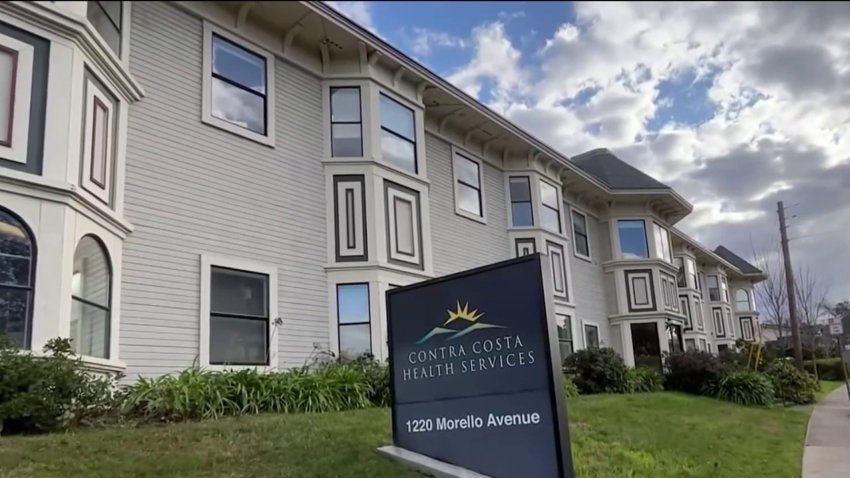In Costa Contra County, a new state Medi-Cal benefit called Enhanced Care Management is accused of ignoring medical needs, sources familiar with the system tell NBC Bay Area. Candice Nguyen reports.
CalAIM is a new California program that is supposed to transform Medi-Cal, which is the state’s health care program providing no-cost and low-cost coverage to some of our most vulnerable residents.
Californians are paying billions of dollars into CalAIM, including for its new ‘Enhanced Care Management’ (ECM) benefit to treat what state leaders describes as “the whole person” – or in other words – to address a patient’s medical and social needs.
But, in an exclusive interview with NBC Bay Area’s Investigative Unit, a nurse currently employed with Contra Costa Health Plan (CCHP), a Medi-Cal managed care plan, said the county’s version of ECM is ignoring medical needs, inflating caseloads and harming patients.
“It’s been really heartbreaking because we are supposed to be helping these patients,” she said.
The nurse asked not to reveal her identity because she said she faced harsh retaliation for trying to report patient harm and patient death concerns.
“I was taken behind closed doors and yelled and screamed at; told that I shouldn't be asking these questions,” she said. “A patient who had a diabetic ulcer on his leg, he was given to a non-medical staff, non-clinical staff…They then didn't address it. Full body infection happened…He needed to have his leg amputated.”

It’s not just that one case, and it’s not the staffer’s fault, the whistleblower said. Incidents like that occur regularly throughout Contra Costa Health’s Enhanced Care Management program, she said. And this is despite California Department of Health Care Services (DHCS) documents stating CalAIM’s ECM benefit is supposed to “address clinical and non-clinical needs.”
In Contra Costa County, the nurse and three other sources familiar with the managed care plan said its ECM program has abandoned medical assistance altogether.

Get a weekly recap of the latest San Francisco Bay Area housing news. Sign up for NBC Bay Area’s Housing Deconstructed newsletter.
They explained, ECM case managers are nurses – who were already with the Contra Costa Health before ECM launched – who are now being instructed to focus only on social needs, like a member’s access to shelter or fresh food. Or they are non-clinical/non-medically licensed staff, like a housing specialist or a community health worker, who are not trained to properly refer medical issues to appropriate medical staff at all.
Local
“They've been told if they don't understand what a health condition is, they just should Google it. They've been told if they don't understand a word in the doctor's note, then again, just to look it up in Google…It's extremely dangerous,” the nurse said.
When asked if she had firsthand knowledge of patients dying because of this problem, the whistleblower replied, “Yes. Yes, I do.”
One fatal case she warned Contra Costa Health supervisors and county officials about, according to internal emails reviewed by the Investigative Unit, involved a patient saying he could not get out of bed. A non-clinical staff member unknowingly labeled the patient as bed bound, and the rest of his care team treated him as such by only providing telephone visits. As a result, the patient did not get out of bed for months and his bed sores turned into bone infections. He later passed away, according to her email to her higher-ups.
Another Contra Costa Health Enhanced Care Management patient she emailed about received “no discussion of health needs [or] health interventions” for a year. When he was clearly sick, he “was on death’s doorstep” and he “then passed away [a] month later.”

“I tried so hard to report this internally, and those concerns were both dismissed. And then I also received just the extreme hostility, abusive treatment,” she said.
NBC Bay Area reached out to Contra Costa Health leadership, including CEO Anna Roth. They all declined this news organization’s interview requests. The health system’s communications officer Kim McCarl agreed to a sit-down interview, declining to speak about specific cases or personnel citing privacy issues.
“It is an unfortunate thing that often times these very complicated cases are far along in their disease process,” said McCarl.
When asked if Contra Costa Health ECM patients get their medical care needs addressed through ECM, McCarl said, “So the way that our model is set up, no. Except that ECM is a part of the entire care model…Contra Costa County is what we call an integrated system. We have a whole clinical arm, and we have a whole ECM arm. And so, we don't need to have our ECM program provide clinical care because our clinic system does that.”

But it doesn’t always, and cases fall through the cracks, according to California’s Department of Health Care Services’ 2023 audit for Contra Costa Health. The state department expanded the scope of the audit after receiving anonymous complaints.
State regulators found patients “complained about not receiving Enhanced Care Management Services.” In one case, “a comprehensive history and physical examination wasn’t completed.” Without proper assessments, regulators said patients “may not receive important behavioral and medical health screenings that can help identify and prevent illnesses.”
Regulators also found serious oversight problems. Contra Costa Health did not have a required compliance officer for more than a year. The health care system told the state its CEO, Anna Roth “assumed the responsibility of informing the Board of Director of compliance activities.” However, regulators found meeting minutes “showed no discussion or any reporting,” and the Board of Directors wasn’t informed of the state’s earlier audit findings.
When the Investigative Unit reached out to the state for comment on this story, DHCS spokesperson Anthony Cava reiterated in an email “both clinical and non-clinical needs….must be addressed by ECM teams.”
When our team pressed for clarification and provided DHCS with more details about the whistleblower’s concerns and Contra Costa Health stating it is not providing clinical care through ECM, a different state department spokesperson Leah Myers responded.
“DHCS will continue to monitor CCHP’s implementation and provision of the ECM benefit to ensure it continues to comply with DHCS’ ECM policy,” Myers said.
The whistleblower said she is not confident in the state’s response, especially with billions of taxpayer dollars involved.
NBC Bay Area confirmed with the state, Contra Costa Health took in $2.5 billion in Medi-Cal revenue in 2022 and 2023 combined. Of that, it spent $56 million on Enhanced Care Management services.
The nurse said she is concerned cutting corners on medical care allows Contra Costa Health to report more patients to the state to get more funding.
“It gives them an excuse to really inflate caseload sizes. Because by ignoring clinical needs there, then it's okay; it's totally manageable to manage just the social needs of 100 patients,” she said.
Contra Costa Health denies that serving more Medi-Cal ECM members means more money for the system.
“The state actually determines the formula upon which we get paid,” said McCarl. “So having more of them is not a financial benefit to us.”
If there is something inappropriate happening, Contra Costa Health might have problems identifying and reporting the problems to the state.
As of the end of the audit period, six out of the system’s seven fraud prevention positions were vacant –as well as its compliance officer and manager positions. This is why the whistleblower said she can’t stay silent.
“I made an oath to the community and as a nurse to advocate for patients,” she said.

Catch up on our reporting:
Part 1: Whistleblower: Contra Costa Health is cutting dangerous corners, harming Medi-Cal patients
Part 2: Nurse whistleblower helps lead to Contra Costa Health criminal investigation by DOJ
Part 3: Contra Costa Health CEO is leaving months into DOJ criminal investigation
Part 4: State finds Contra Costa Co. ECM Medi-Cal program failed to ensure medical care
Investigative Reporter Candice Nguyen led this reporting. If you would like to contact her about this issue or you have another investigation tip, e-mail her at candice.nguyen@nbcuni.com.



